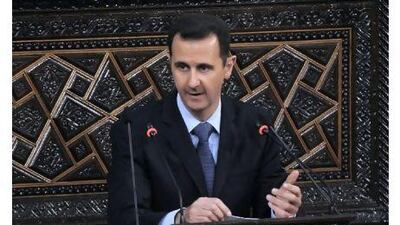DAMASCUS // The Syrian president, Bashar al Assad, yesterday dashed expectations that he would repeal repressive emergency laws and announce political reforms, warning instead that his country faced a "major conspiracy" that he was ready to fight.
Speaking in public for the first time since the outbreak of unprecedented protests and a violent response from security forces in which at least 55 people have died, Mr Assad said planned reforms would not be accelerated in response to growing demands for change, and declined to set a timetable.
The 45-year-old president claimed instead that public protests had been hijacked by a destructive minority who wanted to "ignite chaos" as part of a foreign conspiracy.
"We don't seek battles," Mr Assad said, looking relaxed and cheerful in the face of the most serious challenge since he inherited power from his father, Hafez al Assad, 11 years ago. "But if a battle is imposed on us today, we welcome it."
Before the speech, senior officials had flagged an important announcement on the emergency law with assurances that the draconian legislation in force for almost five decades would be lifted. Mr Assad made no direct reference to such a decision having been taken.
"We are all for reform. That is the duty of the state. But we are not for strife," he said, in an address before parliament that was televised live to an expectant nation yesterday afternoon.
"Reform is not a trend. When the people demand their rights, it is the state's duty to fulfil their demands. What we should watch out for is starting reforms under these circumstances right now; this passing wave."
After Mr Assad's speech, one reform campaigner said: "The bare minimum we expected was an apology for the killings in Deraa, a lifting of the emergency law and a menu of reforms that would be quickly implemented."
In the absence of those steps, anti-government activists are now expected to take to the streets in force again tomorrow.
In his speech Mr Assad specifically differentiated the protests in Syria from uprisings in Tunisia, Egypt, Yemen, Libya and Bahrain.
"This conspiracy is different in shape and timing from what is going on in the Arab world," he said. "Syria is not isolated from the region … but we are not a copy of other countries."
Mr Assad repeated assurances that security forces had been given orders not to fire live ammunition at demonstrators, although civil-rights activists say bullets have killed at least 55 people and possibly more than 100.
Mr Assad also gave some explanation of an announcement last Thursday on the emergency law. At the time, his adviser, Bouthaina Shaaban, had said the legislation would be reviewed, together with other possible reforms.
Rather than coming as a response to public demands, Mr Assad said those steps were nothing new.
"The measures announced on Thursday were not made suddenly," he said. "The emergency law and political parties law have been under study for a year.
"There are more, unannounced reforms … but giving a time frame is a logistic matter. When we announce it in such circumstances, it is difficult to meet that deadline."
Members of parliament cheered the speech loudly, interrupting periodically to chant their willingness to sacrifice their souls for the president, a slogan echoed by thousands of his supporters gathered on the streets of Damascus.
Outside parliament young men in white T-shirts emblazoned with a red heart and the word "Bashar" danced in the street. But that joy was not shared by civil-rights campaigners who had anticipated an historic political announcement.
One Syrian political analyst said: "I'm shocked, none of what people hoped for or expected was in the speech. Now we don't know what will happen. I'm shocked, that's all I can say."
Protests in Syria began gradually little more than two weeks ago, but rapidly expanded after a local dispute in the southern city of Deraa, 100km from Damascus, turned deadly, with security forces gunning down civilians.
Efforts at conciliation floundered after security forces raided a mosque in the city, leading to an explosion in anger and more protests. The government has blamed armed Islamic militants for the uprising.
The spreading unrest resulted in the army being sent in on Saturday to restore order in the coastal city of Latakia, where they remain deployed.
So far protesters have largely limited their demands for increased freedoms and steps to tackle rampant corruption, with few directly aiming their criticisms at the president himself. However there have been isolated - and until recently unthinkable - acts of rebellion against the ruling al Assad family, including protesters defacing posters, pulling down a statue and calling for "the downfall of the regime".
Minor political concessions have been offered to the protesters, including the resignation of the government on Tuesday. But they have fallen far short of demands and, analysts say, have yet to amount to anything concrete.
Since coming to power Mr Assad has said economic reforms must take priority and deep political change may be something for the next generation to push through.

